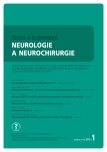-
Medical journals
- Career
Injury as a cause of extrapyramidal syndromes
Authors: prof. MUDr. Egon Kurča, Ph.D.
Authors‘ workplace: Neurologická klinika JLF UK a UN, Martin
Published in: Cesk Slov Neurol N 2018; 81(1): 9
Category: Controversions
Sources
1. Krauss JK. Movement disorders secondary to craniocerebral trauma. Handb Clin Neurol 2015; 128 : 475 – 496.
2. Krauss JK, Tränkle R, Kopp KH. Posttraumatic movement disorders after moderate or mild head injury. Mov Disord 1997; 12(3): 428 – 431.
3. Hallett M. Functional (psychogenic) movement disorders – clinical presentations. Parkinsonism Relat Disord 2016; 22 (Suppl 1): S149 – S152.
4. Van Rooijen DE, Geraedts EJ, Marinus J et al. Peripheral trauma and movement disorders: a systematic review of reported cases. J Neurol Neurosurg Psychiatry 2011; 82(8): 892 – 898.
5. Frei K. Posttraumatic dystonia. J Neurol Sci 2017; 379 : 183 – 191.
6. Lin PT, Hallett M. The pathophysiology of focal hand dystonia. J Hand Ther 2009; 22(2): 109 – 113.
Labels
Paediatric neurology Neurosurgery Neurology
Article was published inCzech and Slovak Neurology and Neurosurgery

2018 Issue 1-
All articles in this issue
- Injury as a cause of extrapyramidal syndrome
- Injury as a cause of extrapyramidal syndromes
- Injury as a cause of extrapyramidal syndromes Comment on controversies
- Olfactory groove meningiomas – surgical treatment, surgical risks and sense of smell preservation
- Neuropalliative and rehabilitative care in patients with an advanced stage of progressive neurological diseases
- Protective factors for cognitive impairment in multiple sclerosis
- Assessment of cognitive functions using short repeatable neuropsychological batteries
- Test of gestures (TEGEST) for a brief examination of episodic memory in mild cognitive impairment
- The importance of morphological and clinical classifications of lumbar spine stenosis in the preoperative planning
- Parosmia and phantosmia in patients with olfactory dysfunction
- SCN1A mutation positive Dravet syndrome, genetic aspects and clinical experiences
- Sentence comprehension in Slovak-speaking patients with Parkinson disease
- The pilot study of effect of outpatient functional electrical stimulation of peroneal nerve
- A neurological view on spondylodiscitis
- Statins and their effects on the peripheral nervous system
- Cavernous sinus thrombosis – still occurring complication of rhinosinusitis
- T1 radiculopathy due to massive disc herniation at T1/2
- Neuropathological post-mortem examination of the brain and the spinal cord in ten key points – What can a neurologist expect from the neuropathologist’s confirmation of the clinical diagnosis in neurodegenerative diseases?
- Long-term follow up of a patient with primary cervical spinal cord meningeal melanocytoma
- Neurosurgical resident training in the Czech Republic
- Alternative forms parallel to the Czech versions of Rey Auditory Verbal Learning Test, Complex Figure Test and Verbal Fluency
- Leiomyoma of the palm
- Dural-based posterior fossa giant cavernous hemangioma masquerading as hemangiopericytoma
- Czech and Slovak Neurology and Neurosurgery
- Journal archive
- Current issue
- Online only
- About the journal
Most read in this issue- A neurological view on spondylodiscitis
- Parosmia and phantosmia in patients with olfactory dysfunction
- Assessment of cognitive functions using short repeatable neuropsychological batteries
- Cavernous sinus thrombosis – still occurring complication of rhinosinusitis
Login#ADS_BOTTOM_SCRIPTS#Forgotten passwordEnter the email address that you registered with. We will send you instructions on how to set a new password.
- Career

